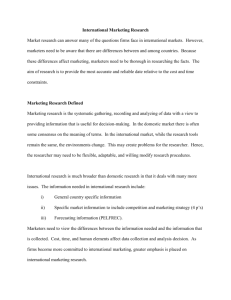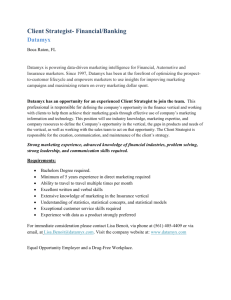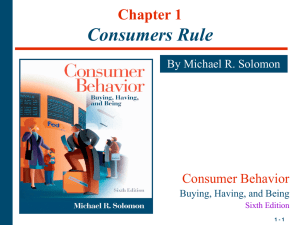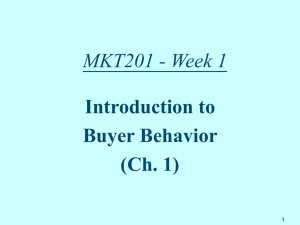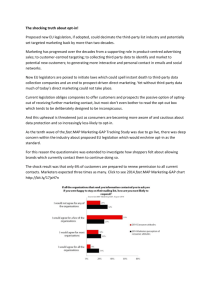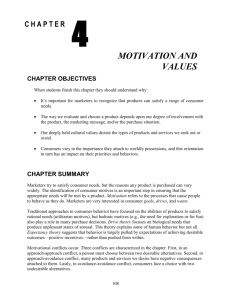Curative International Marketing
advertisement
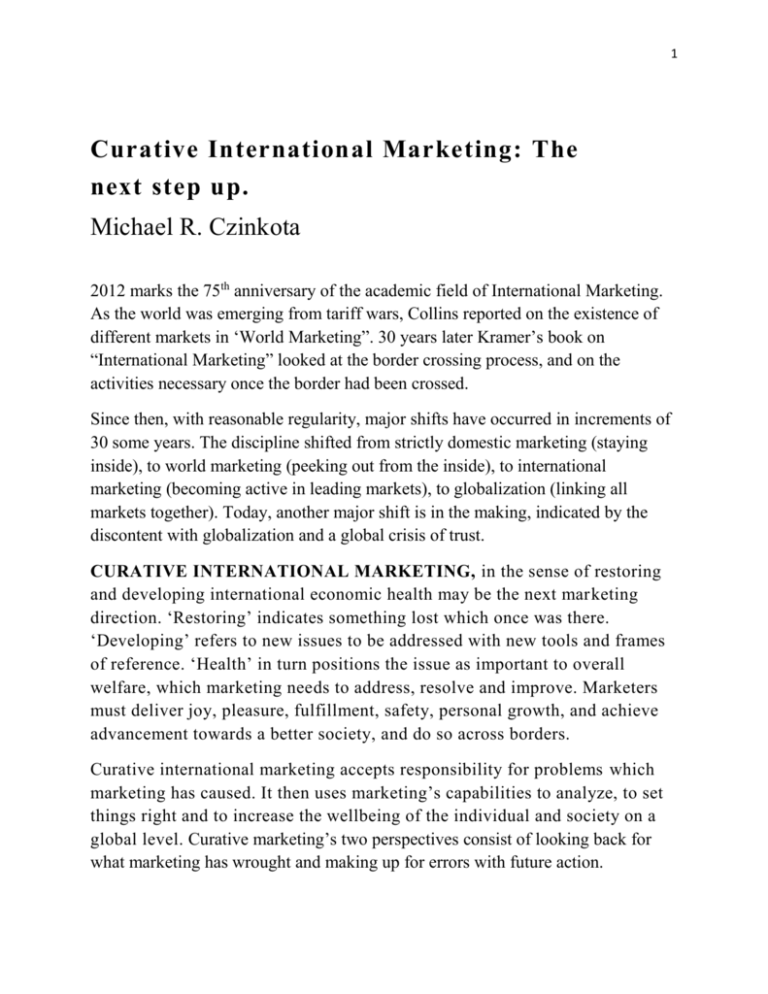
1 Curative International Marketing: The next step up. Michael R. Czinkota 2012 marks the 75th anniversary of the academic field of International Marketing. As the world was emerging from tariff wars, Collins reported on the existence of different markets in ‘World Marketing”. 30 years later Kramer’s book on “International Marketing” looked at the border crossing process, and on the activities necessary once the border had been crossed. Since then, with reasonable regularity, major shifts have occurred in increments of 30 some years. The discipline shifted from strictly domestic marketing (staying inside), to world marketing (peeking out from the inside), to international marketing (becoming active in leading markets), to globalization (linking all markets together). Today, another major shift is in the making, indicated by the discontent with globalization and a global crisis of trust. CURATIVE INTERNATIONAL MARKETING, in the sense of restoring and developing international economic health may be the next marketing direction. ‘Restoring’ indicates something lost which once was there. ‘Developing’ refers to new issues to be addressed with new tools and frames of reference. ‘Health’ in turn positions the issue as important to overall welfare, which marketing needs to address, resolve and improve. Marketers must deliver joy, pleasure, fulfillment, safety, personal growth, and achieve advancement towards a better society, and do so across borders. Curative international marketing accepts responsibility for problems which marketing has caused. It then uses marketing’s capabilities to analyze, to set things right and to increase the wellbeing of the individual and society on a global level. Curative marketing’s two perspectives consist of looking back for what marketing has wrought and making up for errors with future action. 2 Global problems require a global approach. Curative international marketing needs to draw on jurisprudence, cultural anthropology, philosophy and history. Such perspective acknowledges that marketing is too important to be left to marketers consonant with Keynes questioning “how and whether economics should rule the world”. International marketers need to focus on past errors and mistakes inflicted by their discipline and sweep these out from under the carpet in the spirit of “Wiedergutmachung” or restitution. Marketing’s disregard of local idiosyncrasies has sometimes been like bringing snakes to Guam which almost exterminated all local birds, Examples of heavy burdens inflicted by outsiders were the smallpox, flu and typhus viruses brought by the conquistadors to the Inca of Peru. More contemporaneous is a current law suit: The Pine Ridge Indian tribe is suing five beer companies for their role in the alcoholism and fetal alcohol syndrome that plague the tribe’s reservation. The Oglala Sioux Tribe claims that the beer companies sold beer on the perimeter of the teetotalling South Dakota reservation with the knowledge that it would be smuggled. Whiteclay, a nearby town in Nebraska with four beer shops and only about a dozen residents, gets most of its customers from the reservation. Tom White, the lawyer representing the tribe, told the Associated Press: "You cannot sell 4.9 million 12 oz. cans of beer and wash your hands like Pontius Pilate, and say we've got nothing to do with it being smuggled." The reservation, which is about the size of Connecticut, has dealt with poverty and alcoholism for decades. One in four children born suffer from fetal alcohol syndrome, and the life expectancy, between 45 and 52 years, is the lowest in the U.S. Take Eastern Europe’s transition from socialism to market practices. Advertisements were taken literally, leading to grave disappointments by consumers, since they did not win the “promised” car, or look like Heidi Klum. Local foods (and their producers) disappeared because newly entering chain stores already had suppliers. Take emerging nations where consumption is the new mantra. Marketers increasingly have sophisticated research at their disposal to 3 ensure consumption addiction. Kotler calls this phenomenon the consumer chain, like a heavy iron ball to be carried around. At the business level growth is not just important, but the key issue for survival. Executives planning to maintain market share, or to minimize growth, would last a very short time in their job. More is expected. “Citius, altius, fortius” (faster, higher, stronger) may be a great motto for the Olympics, but leads to unexpected repercussions for marketers and their customers. Negative effects may result from marketing’s misleading of consumers, or simply from unawareness or neglect. For new ventures, it is the obligation of international marketers to understand local conditions and to anticipate and limit possible ill effects. Marketers must avoid causing short or long term harm and make restitution for any damages. Not everything that can be done should be done. A marketing Hippocratic Oath: “First do no harm” should be followed by doing everything possible to make people be better off and actually feel better. A second key concern is: how marketing can set things right again. Truthfulness: On many occasions international marketing has either actively mislead expectations, or left its participants with a sense of substantial ambiguity. Marketing must base itself on fact rather than emotion, on insights rather than speculation, and do so within societal changes of context. Just as human beings change, social science truths may not be eternal but rather subject to change over time. When a customer feels gauged by marketing, the discipline is weakened. This responsibility for the entire field places a requirement of honesty on each marketing actor. Simplicity: Marketing must find new ways to simplify life. Simplicity adds value. Research finds that up to 23 percent of consumers are willing to spend extra for an uncomplicated experience. Simplification is also linked to truthfulness and making sure that people understand the implications of their decisions. It is hard for a front line marketer to be truthful about something, if one does not understand how the 4 system works. The understanding of how a product or even a system works and is interconnected is a valuable product attribute in itself. Marketers need to eliminate incongruities. It makes little sense when customers call, are on hold, and hear that ‘your call is important to us’. If the call were truly important, then the firm would hire more employees to answer phones. Expanded participation: International marketing needs to be truly international in its outlook. For example using only English as the ‘language of business’ denigrates the use of other languages and reduces the idiosyncratic and precise participation of other nations and their citizens. If Eskimos had to talk about snow only in English, the rich diversity of this theme in their own language would be sharply diminished. Inclusiveness also helps with future change. History indicates that power waxes and wanes. Just think of the Incas, the Greeks, the Icelanders, the Persians. Marketing preparation, can convert crashes into soft landings. Communication with critics is essential. Opponents are a constituency that must be brought into the tent. Human tendency is to focus on and celebrate winners. But not everyone touched by international marketing will come out a winner. International marketing relies on a fundamental belief into the virtues od risk, competition, profit and private property. Yes, not everyone considers these four dimensions as crucial or acceptable. When the rising tide lifts all boats, it becomes crucial that the vessels don’t leak, that the crew has been trained, and that the sails are tight and strong. Otherwise there is only a ‘winner takes all’ approach. Personal responsibilities. In international marketing, distance can mean abdication of responsibility. Marketers sometimes demonstrate their desire not to know—by appointing a middleman about whose behavior one can later on be suitably astonished, and mortified. Though the chairman of the multinational corporation may feel removed from local issues, be assured that the locals take all of the firm’s actions very personally. Though many say that we understand each other so well, the reality is quite different. The actual overlap between societies is typically miniscule. Some Chinese leaders may have developed a good understanding of the world, but they 5 represent a very small fraction of the Chinese populace. The average Chinese person may understand as much about Columbus, Ohio as the average American knows about Tianjin. The goal for international marketers is not only to apply existing frameworks to new situations but also to develop new frameworks from the insights that they garner from working in different and diverse environments. Governments are playing a new and growing role in international marketing. In part this has been the outgrowth of global crises which had not been anticipated or addressed by market forces. Today there are new global regulations and restrictions. However, it is not clear whether the signals of the market place or the plans and mandates of governments are more accurate. Markets are not always successful in their constraints and self-regulation, and governments are not always free of fault and ambition. We need to set reasonable boundaries for firms. A key tenet of marketing is reverence for the customer. Many firms stray and take a predatory approach. Skuba works on the phenomenon of Vampire Marketing to highlight inappropriate unjust, and ultimately counterproductive actions by firms. Typically, this takes place when the key consumption decision has already been made, but circumstances allow for additional offers. High minibar charges in a hotel, or pillows for rent on an airplane are examples. For international marketers change is a key opportunity. Curative Marketing can help us all, by overcoming past shortcomings and avoiding future ills. Marketers are the agents of change and need to be directly involved in change. As the great Ludwig von Wittgenstein stated: “A philosopher who is not taking part in discussions is like a boxer who never goes into the ring.” It is time for international marketers to enter the ring. 6 1. The Washington Post, Tribe Sues Beer Companies For Alcoholism on Reservation, February 10, 2012 2. Global Brand Simplicity, 2011

